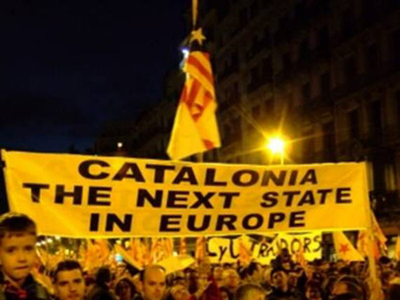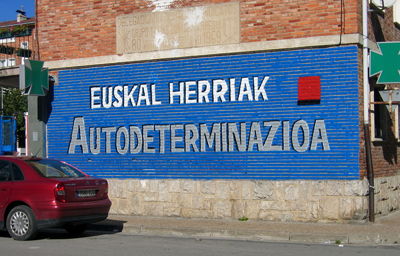Two days after Kosovo's declaration of independence in spite of Serbia's opposition, the debate [1] about the merits of recognising it as a state is still raging. According to the website Kosova Thanks You [2], so far 17 countries have recognized the new Republic of Kosovo and 34 others are ready to do so. Within the European Union, countries such as France, UK, Germany or Italy have recognized it, while others such as Slovakia and Spain have strongly opposed it [3] as they consider that the declaration does not respect international law.
However, Spain vehemently protested to Russia [4] a few days ago over remarks by President Vladimir Putin in which he likened the situation in Kosovo to that in Spain's Basque and Catalan regions. For the Spanish government, Kosovo has nothing to do either with Catalonia [5] or with the Basque Country [6].
Bloggers in Catalonia [9] have been debating the issue intensely during the last few days. While supporters of an independent Catalonia have welcomed Kosovo's independence with campaigns like adding a banner [10] recognizing the new state or including the title “Today Kosovo, Tomorrow Catalonia” [11] in as many blogs as possible, other Catalan bloggers agree with the position of the Spanish government.
Diari del votant anònim [cat] thinks that Scotland is a much better model to admire, and Joan Safont [cat] thinks [12] that Kosovo should not be dismissed as an example to follow by other European regions with aspirations of sovereignty:
It is not comparable with Catalonia or the Basque Country. However, I think that any process towards sovereignty in Europe should take it into consideration. That's the reason why we are so repeatedly told that the two cases are different.
[…] Kosovo might not be our mirror, but every time that a new state says freely what and how it wants to be, the world becomes freer.
Narcís Sastre [cat], however, is not sure about what to think [13]:
I can't help but having contradictory feelings. On one hand, as a defender of people's right to self-determination, I am happy for Kosovo, but I can't help feeling a certain empathy with Serbia, who is witnessing the loss of a territory with a great symbolic and historical value.
The Basque government, on the other hand, expressed its enthusiasm [14] even before Kosovo's declaration of independence considering it an example of “how to solve identity and belonging conflicts in a peaceful and democratic way”. Basque senator Iñaki Anasagasti also applauded Kosovo's move [15] in his blog [es]:
The best news of the week have been the independence of Kosovo. Not a single bullet shot, not a single kale borroka [16] action, with a new president visiting the Serbs in Kosovo assuring them that the new country in which everybody will live without discrimination and with respect.
These statements have stirred controversy on the issue and have been rejected by a wide array of Spanish blogs and forums, that consider that Basque politicians like Anasagasti “live in a parallel reality”. A user of the social portal Menéame ironically says [17]:
So in Kosovo there was no genocide, there was no bombing by NATO, it's not an occupied country in which only the presence of foreign forces guarantees the peace, there are no old hatreds… all of that took place in my imagination.
For Francisco Veiga [20] [es], what is at stake in Europe after Kosovo's independence is not that it may create a precedent for other territories, but the type of precedent that it is:
[…] What is being debated here is not the old byzantine-politological discussion about the intangibility of really existing borders or the hypothetical “domino effect” on Iberian sovereignty movements. The issue at stake is another.
The central problem […] is that Washington and Brussels are recognizing, de facto and de jure, the validity of the armed way to achieve nationalist political objectives in the European continent. Or more precisely, the old basic principle of “action-reaction” of guerrilla and terrorist groups since more than a century. Because that's what is shown by the fact that the current Albanian-Kosovar Prime Minister of Kosovo is Hashin Thaçi, a former guerrilla commander of UÇK [21] whose code name was “Snake.” Or that another Prime Minister, Ramush Haradinaj, also a former military leader of UÇK, is being tried in the ICTY in The Hague for War Crimes.
He also adds, in his latest post, that the EU has unknowingly managed to align most Balkan countries in their lack of enthusiasm for Kosovo's declaration of independence, and criticizes EU's role in the process [22]:
In fact, EU's behavior in the Balkans doesn't differ all that much from the one that European hegemonic powers would have adopted a century ago. Actually, it's the perfect anniversary: 1908-2008. The first date marks the annexation by the Austro-Hungarian Empire of what was then the protectorate of Bosnia-Hercegovina, which led to the Great War five years later.
Although in his blog Cartas del Este [es] Basque professor Asier Blas didn't support Kosovo's independence, he is is optimistic [23] about the benefits of the new state of Kosovo for its Serbian minority:
At the end of the day [Kosovo] is not for me and not for you, not for Albania nor Serbia, it's for Kosovars. And in the long term this move especially favors the Serbs, because if Kosovo manages to establish itself as an entity with its own uniqueness, the ghosts of a future Greater Albania will be left behind […]
We should add to all this the opportunities that the future membership to the European Union will bring. If it happens not too far away in the future, the outcome will be that the Albanian and Serbian populations will have a very free relationship with Albania and Serbia. Newspapers from Serbia will reach Serbian-Kosovars, as well as TV stations and other cultural products. There will not be boundaries and regional economic integration will be underway, which will make it possible to play down the limits of the current states.

